Input interpretation

(-)-L-carnitine
Chemical names and formulas
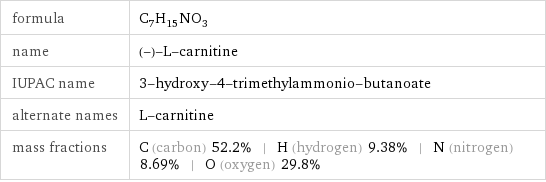
formula | C_7H_15NO_3 name | (-)-L-carnitine IUPAC name | 3-hydroxy-4-trimethylammonio-butanoate alternate names | L-carnitine mass fractions | C (carbon) 52.2% | H (hydrogen) 9.38% | N (nitrogen) 8.69% | O (oxygen) 29.8%
Lewis structure
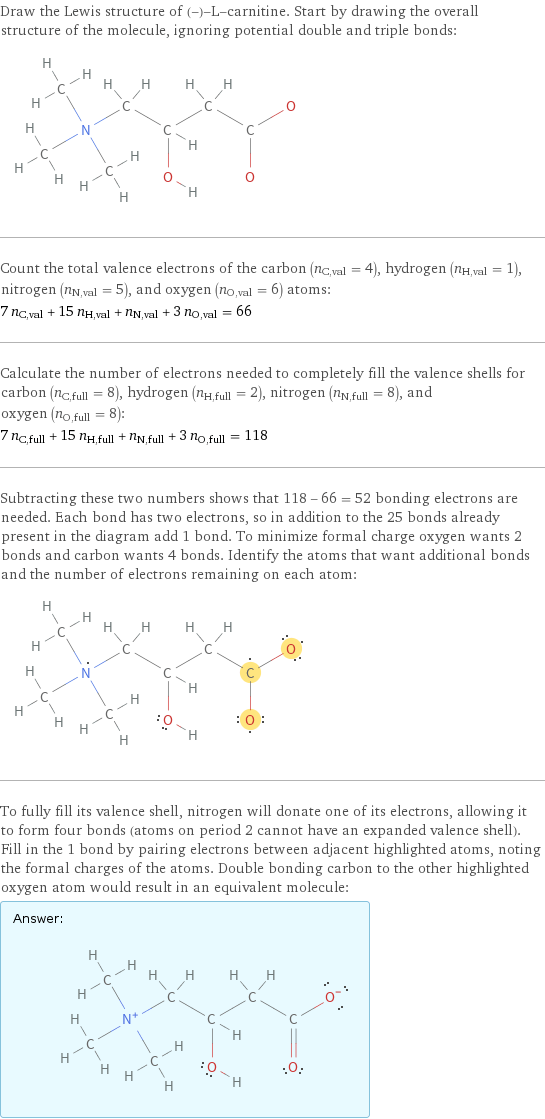
Draw the Lewis structure of (-)-L-carnitine. Start by drawing the overall structure of the molecule, ignoring potential double and triple bonds: Count the total valence electrons of the carbon (n_C, val = 4), hydrogen (n_H, val = 1), nitrogen (n_N, val = 5), and oxygen (n_O, val = 6) atoms: 7 n_C, val + 15 n_H, val + n_N, val + 3 n_O, val = 66 Calculate the number of electrons needed to completely fill the valence shells for carbon (n_C, full = 8), hydrogen (n_H, full = 2), nitrogen (n_N, full = 8), and oxygen (n_O, full = 8): 7 n_C, full + 15 n_H, full + n_N, full + 3 n_O, full = 118 Subtracting these two numbers shows that 118 - 66 = 52 bonding electrons are needed. Each bond has two electrons, so in addition to the 25 bonds already present in the diagram add 1 bond. To minimize formal charge oxygen wants 2 bonds and carbon wants 4 bonds. Identify the atoms that want additional bonds and the number of electrons remaining on each atom: To fully fill its valence shell, nitrogen will donate one of its electrons, allowing it to form four bonds (atoms on period 2 cannot have an expanded valence shell). Fill in the 1 bond by pairing electrons between adjacent highlighted atoms, noting the formal charges of the atoms. Double bonding carbon to the other highlighted oxygen atom would result in an equivalent molecule: Answer: | |
3D structure
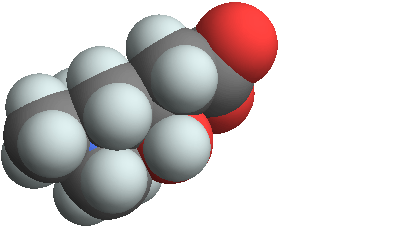
3D structure
Basic properties
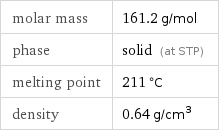
molar mass | 161.2 g/mol phase | solid (at STP) melting point | 211 °C density | 0.64 g/cm^3
Units

Hydrophobicity and permeability properties

predicted LogP hydrophobicity | -2.9 predicted LogS | -1.6
Basic drug properties

approval status | approved | small molecule drug categories | metabolite | nootropic agent | nutraceutical | vitamin b complex | vitamin (Vitamin B Complex) dosage forms | oral: liquid | intravenous: solution | oral: tablet

brand names | carnitor | karnitin | nicetile
Solid properties (at STP)

density | 0.64 g/cm^3
Units

Chemical identifiers
(C)CC(CC(=O)[O-])O InChI identifier | InChI=1/C7H15NO3/c1-8(2, 3)5-6(9)4-7(10)11/h6, 9H, 4-5H2, 1-3H3 InChI key | PHIQHXFUZVPYII-ZCFIWIBFBS EU number | 208-768-0 RTECS number | BP2980000](../image_source/d17a1ff0cd81de023248665c5cd787a9.png)
CAS number | 541-15-1 Beilstein number | 4292315 PubChem CID number | 288 PubChem SID number | 7849237 SMILES identifier | C[N+](C)(C)CC(CC(=O)[O-])O InChI identifier | InChI=1/C7H15NO3/c1-8(2, 3)5-6(9)4-7(10)11/h6, 9H, 4-5H2, 1-3H3 InChI key | PHIQHXFUZVPYII-ZCFIWIBFBS EU number | 208-768-0 RTECS number | BP2980000
NFPA label

NFPA label
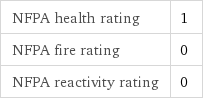
NFPA health rating | 1 NFPA fire rating | 0 NFPA reactivity rating | 0
Safety properties

autoignition point | 365 °C
Toxicity properties

RTECS classes | drug | natural product